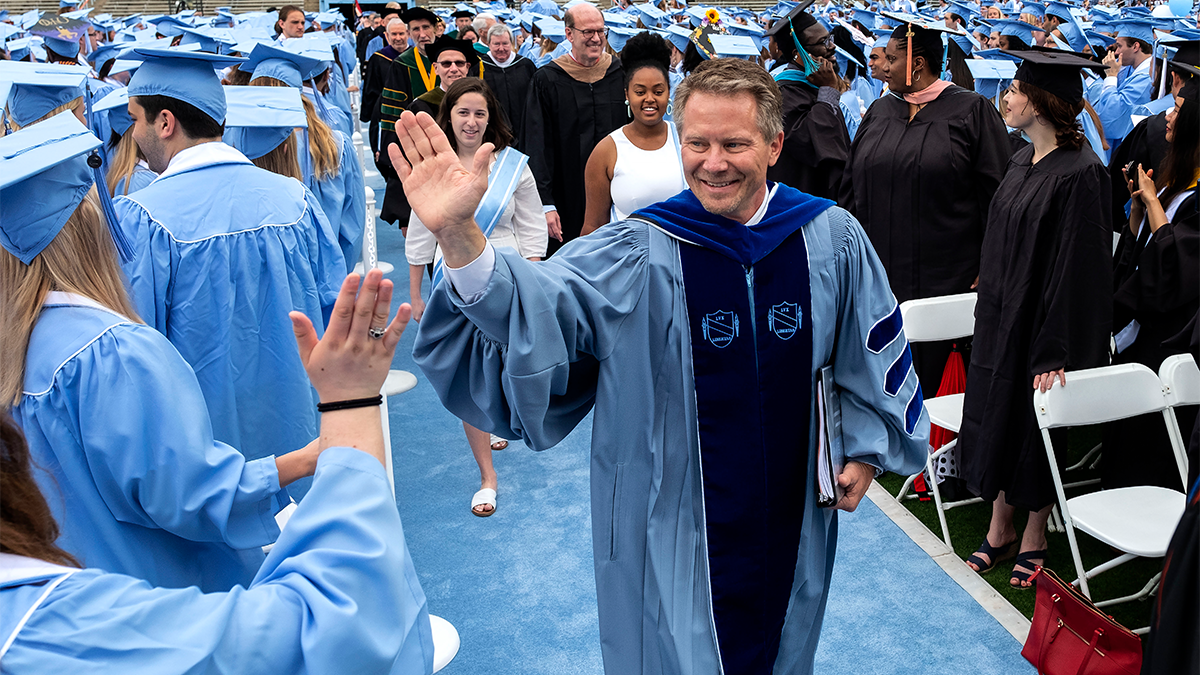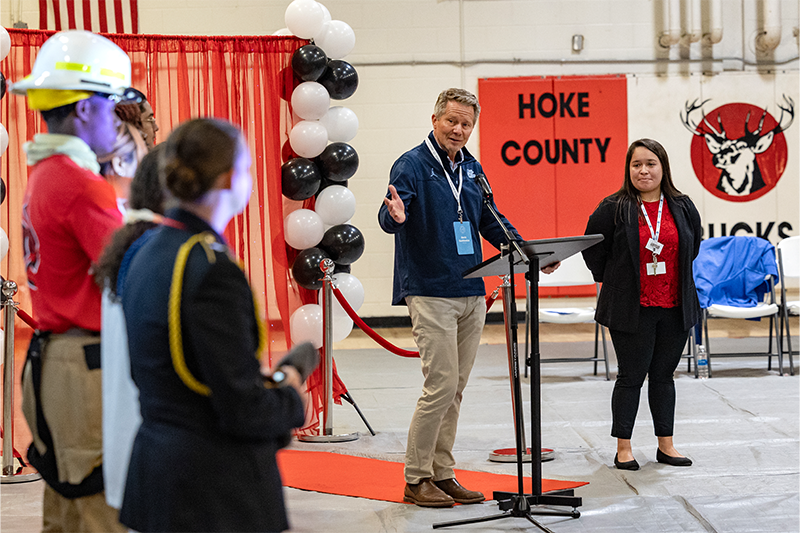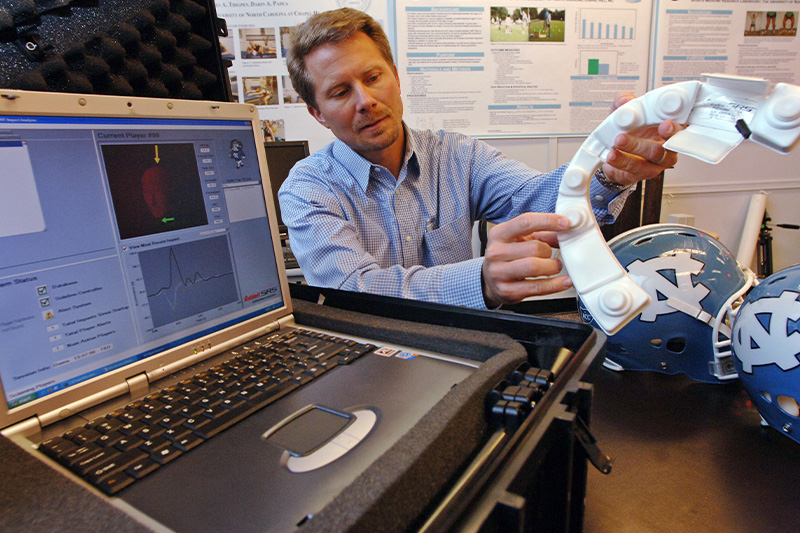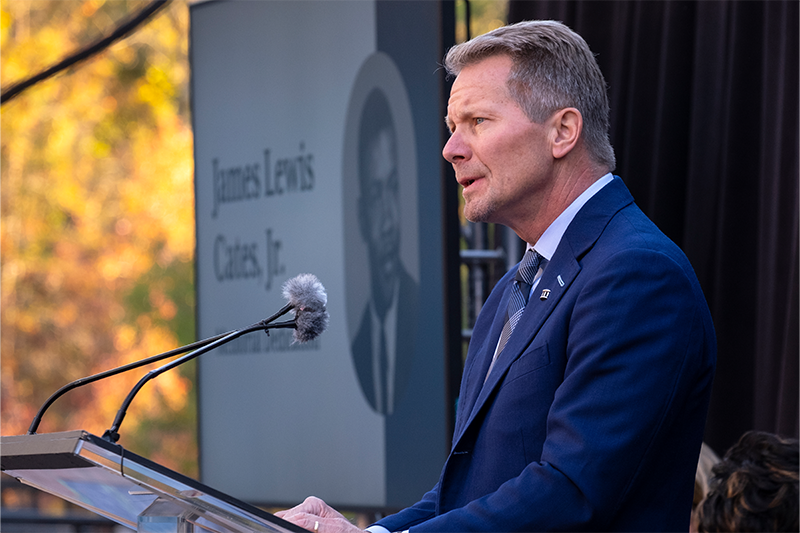Kevin Guskiewicz leaves dual legacy of research, leadership
A renowned concussion researcher, Carolina’s 12th chancellor increased funding and steered the University through a pandemic.

Kevin M. Guskiewicz arrived at Carolina nearly 30 years ago. He was a neuroscientist determined to take the guesswork out of assessing a concussion’s impact on an athlete. Protocols resulting in part from his research are now widely used in high school and college sports and in the NFL. His groundbreaking work earned him a MacArthur Foundation “genius” grant and a distinguished professorship.
Working his way up from department chair to senior associate dean to dean of the College of Arts and Sciences, he took the same innovative approach to education. As dean, he oversaw the revamping of the general education curriculum and championed active learning techniques and study abroad. He led the College’s strategic planning effort and exceeded its fundraising goals, raising more than $400 million in three years.
Known for his early morning runs across campus and friendly fist-bump greetings to students and colleagues, the pragmatic and personable Guskiewicz became Carolina’s interim chancellor in February 2019, following the departure of Carol L. Folt. He was selected for the position permanently in December 2019 and installed the following Oct. 11 as the University’s 12th chancellor amid the COVID-19 pandemic.
This December Guskiewicz announced that he would be leaving Carolina on Jan. 12 to become president of Michigan State University. Here is a look back at his Tar Heel legacy.
A time of growth and outreach
Guskiewicz’s tenure as chancellor of the nation’s first public university was marked by growing institutional achievement.
As chancellor, he presided over the University’s most successful fundraising effort, the historic Campaign for Carolina, which raised more than $5 billion — including surpassing the goal of $1 billion for scholarships and fellowships — at its conclusion in 2022. The university’s research enterprise grew to $1.36 billion annually, making Carolina the nation’s 12th largest research university. Among public institutions, Carolina ranks 8th overall in federal research funding and has an R1 ranking from the Carnegie Foundation for its high research activity.
For the 19th time, Carolina remained the best value among public institutions in the 2023 U.S. News and World Report rankings. The magazine also ranked Carolina as the No. 4 public university and No. 22 overall (tied with Georgetown University), up seven positions from a year ago. Applications and enrollment continued to grow at record rates.
Amid this continued success, Guskiewicz also launched several new initiatives. The chancellor led the implementation of the University’s strategic plan, Carolina Next: Innovations for Public Good, which he called “an effective roadmap to help us fulfill our mission and live out our values.”
He also called for the redesign of the General Education curriculum. Developed over three years with input from hundreds of faculty, staff, students and other stakeholders, the new IDEAs in Action curriculum prepares students for careers that don’t yet exist and offers more critical experience with internships, research opportunities and study abroad. A believer in a university that he called “passionately public,” he introduced a program to cover tuition and mandatory fees for eligible in-state applicants whose family income is less than $80,000, starting in fall 2024.
As chancellor and in previous leadership roles, Guskiewicz supported several new additions to the nation’s oldest public university. The School of Data Science and Society came online in 2022, its first offering a master’s degree in applied data science. He nurtured new departments of biomedical engineering, applied physical sciences, the Global Guarantee for study abroad and the Institute for Convergent Sciences, to speed the commercialization and impact of new discoveries.

Chancellor Kevin M. Guskiewicz speaking at Hoke County High School during the 2023 Tar Heel Bus Tour. (Johnny Andrews/UNC-Chapel Hill)
Embracing the University’s mission of service to the state, Guskiewicz announced Carolina Across 100, a five-year pan-university initiative to address challenges by partnering with communities in each of the state’s 100 counties. Closer to home, he created the Carolina Economic Development Strategy Council in 2021 and worked with local government officials to retain, attract and grow more innovation-oriented companies and talent in Chapel Hill. Securing funding to build the “innovation corridor” connecting the downtown Chapel Hill business district with Carolina’s campus, he cut the ribbon on Carolina’s Innovation Junction, a flexible Franklin Street space to launch new ventures and nurture entrepreneurship.
Guskiewicz also revived and expanded the Tar Heel Bus Tour, an annual trek across several counties to introduce faculty members to different parts of the state and show how Carolina research impacts the people living there.
Impact through research
With these many achievements in academic leadership, Guskiewicz made great impact in his research and teaching, both of which he continued to pursue while chancellor.
As a researcher, Guskiewicz was one of the first to call attention to the damaging long-term effects of concussions. He was struck by the subjectivity of trainers and coaches in evaluating concussions, how they used questions like “How do you feel?” or “Are you dizzy?” instead of something more scientific, like a test. As a doctoral student at the University of Virginia, he and a colleague developed a test that combined a physical evaluation of balance and a computer evaluation of the athlete’s memory, attention and recall.

Protocols resulting in part from Chancellor Kevin M. Guskiewicz’s research are now widely used in high school and college sports and in the NFL. (Dan Sears/UNC-Chapel Hill)
In 1995, the neuroscientist came to Carolina to continue his research on sport-related concussions, becoming a Kenan Distinguished Professor of Exercise and Sport Science in 2009. At Carolina, he founded two research centers on these topics, the Center for the Study of Retired Athletes, and the Matthew Gfeller Sport-Related Traumatic Brain Injury Research Center.
In 2011, his research earned him the prestigious MacArthur Fellowship, and in 2013, Time magazine named him a Game Changer, one of 18 “innovators and problem-solvers that are inspiring change in America.”
Challenges faced
Guskiewicz called on his experience as a problem solver when facing challenges in his nearly five years as chancellor. One of the earliest was a $110 million structural deficit made worse by budget shortfalls caused by the pandemic. Involving administrators across campus in an effort led by Chief Financial Officer Nate Knuffman, he enacted a new and transparent budget model for the University’s $4 billion annual operating budget in 2021. With balanced budgets for the past three years, the University now has a process for making strategic financial decisions.
Guskiewicz made the Build Our Community Together strategic plan initiative a top priority. Earlier, he established the History, Race and a Way Forward Commission and sought Board of Trustees approval for the removal of the names of four white supremacists from campus buildings.
Two buildings received new names, one honoring Hortense McClinton, Carolina’s first Black professor, and one in tribute to Henry Owl, the first American Indian and the first person of color to enroll at the University. The chancellor also presided over the dedication of a plaque in the Pit in memory of 22-year-old James Lewis Cates Jr., who died as a victim of racial violence on campus in 1970.

Chancellor Kevin M. Guskiewicz speaking at the James Lewis Cates Jr. Memorial Dedication held at the Pit on Nov. 21, 2022. (Jon Gardiner/UNC-Chapel Hill)
Of course, the challenge that loomed above all else was the COVID-19 pandemic, the biggest health emergency in a century. When the coronavirus first hit locally in March 2020, students were told not to come back from spring break, and faculty had to pivot immediately to provide remote learning to finish the semester.
The preparations by the chancellor and his leadership team for a return to campus in fall 2020 were upended by clusters of infections, and students were sent home again. Yet the pandemic also led the university to make important and innovative changes, such as the creation of a campus-led COVID-19 testing program and the expansion of Campus Health services to meet the challenge. Concerns about anxiety and isolation related to the pandemic led the chancellor to increase attention to mental health services. This support included increasing capacity at Counseling and Psychological Services and integrating mental health first aid and telehealth programs for students, faculty and staff.
In the campus message announcing his decision to leave Carolina, Guskiewicz thanked his fellow Tar Heels for their support, calling them “Carolina’s legacy and its future.”
“For 230 years, our University has been a shining light and an example of the promise of public education in this country,” he wrote. “I am confident that together, our students, faculty, staff, alumni and the amazing supporters of our University will continue to accomplish great things in the years to come.”







